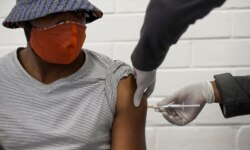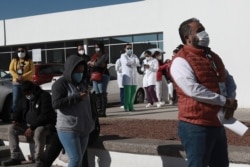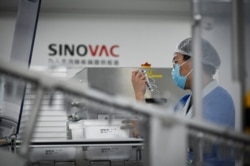South Africa suspended its vaccination campaign against COVID-19 Sunday after a new study revealed that the AstraZeneca vaccine is less effective against a variant of the virus found in the country.
The World Health Organization is holding a meeting Monday about the latest development in South Africa.
The study, conducted by the University of the Witwatersrand in Johannesburg and not yet peer reviewed, concluded that the British vaccine offered only "limited protection against moderate forms of the disease caused by the South African variant, in young adults."
The news was a blow to South Africa, which has seen more than 46,000 people die from the virus. It had planned to begin inoculating its population with a million doses of the AstraZeneca vaccine in the coming days. But the study found that the vaccine was only 22% effective in moderate cases of the South African variant of the disease.
The study did not explore the vaccine’s effect against severe cases. The variant has been found in at least 32 other countries including the United States.
AstraZeneca said Sunday it was developing another vaccine that would be more effective against the South African variant, which could be expected by this autumn.
Mexican website
Millions of Mexicans were frustrated last week with the rollout of the country’s website to register people for coronavirus vaccine appointments. The first group designated to use the site to arrange appointments were the country’s senior citizens.
One man told Britain’s Guardian newspaper that he “spent three days fighting with the website” to get a vaccination appointment for his mother. He told the newspaper his mother “would have been unable to do it without me.”
The shaky launch of the site is disheartening for a country that has the third highest number of deaths from the coronavirus. Mexico has more than 166,200 COVID deaths. Only Brazil and the U.S. have more, with 231,534 and 463,477 respectively, according to Johns Hopkins Coronavirus Resource Center.
The U.S. remains at the top of Hopkins’ list as the place with the most COVID infections. The U.S. now has more than 27 million cases, followed by India with 10.8 million and Brazil with 9.5 million.
Iran, China announce new vaccines
Over the weekend, both Iran and China unveiled new vaccines against the virus. On Sunday, Iran announced it had developed the Razi Cov Pars vaccine manufactured by the Razi Vaccine and Serum Research Institute. Scientists will begin testing the vaccine on people this week.
On Saturday, China’s National Medical Products Administration said in a statement that regulators approved the use Friday of CoronaVac, developed by Sinovac Biotech Ltd.
It’s the second vaccine approved for public use in the East Asian country. The first, a vaccine developed by a Chinese institute affiliated with the state-owned China National Pharmaceutical Group, Sinopharm, was approved two months ago.
The Sinovac vaccine, which is being administered in at least five other countries, was given emergency approval last July for high-risk people, such as health care workers and employees of state-owned companies.
Conditional approval of the vaccine allows its use for the general public, while research continues. The company must submit current data and reports of any adverse effects after the vaccine is sold on the market.
More than 59 million doses of COVID-19 vaccines have been distributed across the U.S., the Centers for Disease Control and Prevention said Sunday. More than 41 million doses of the Moderna and Pfizer-BioNTech vaccines had been administered by Sunday morning, with more than 31.5 million people receiving the first inoculation according to the CDC. More than 9 million people received their second dose.








